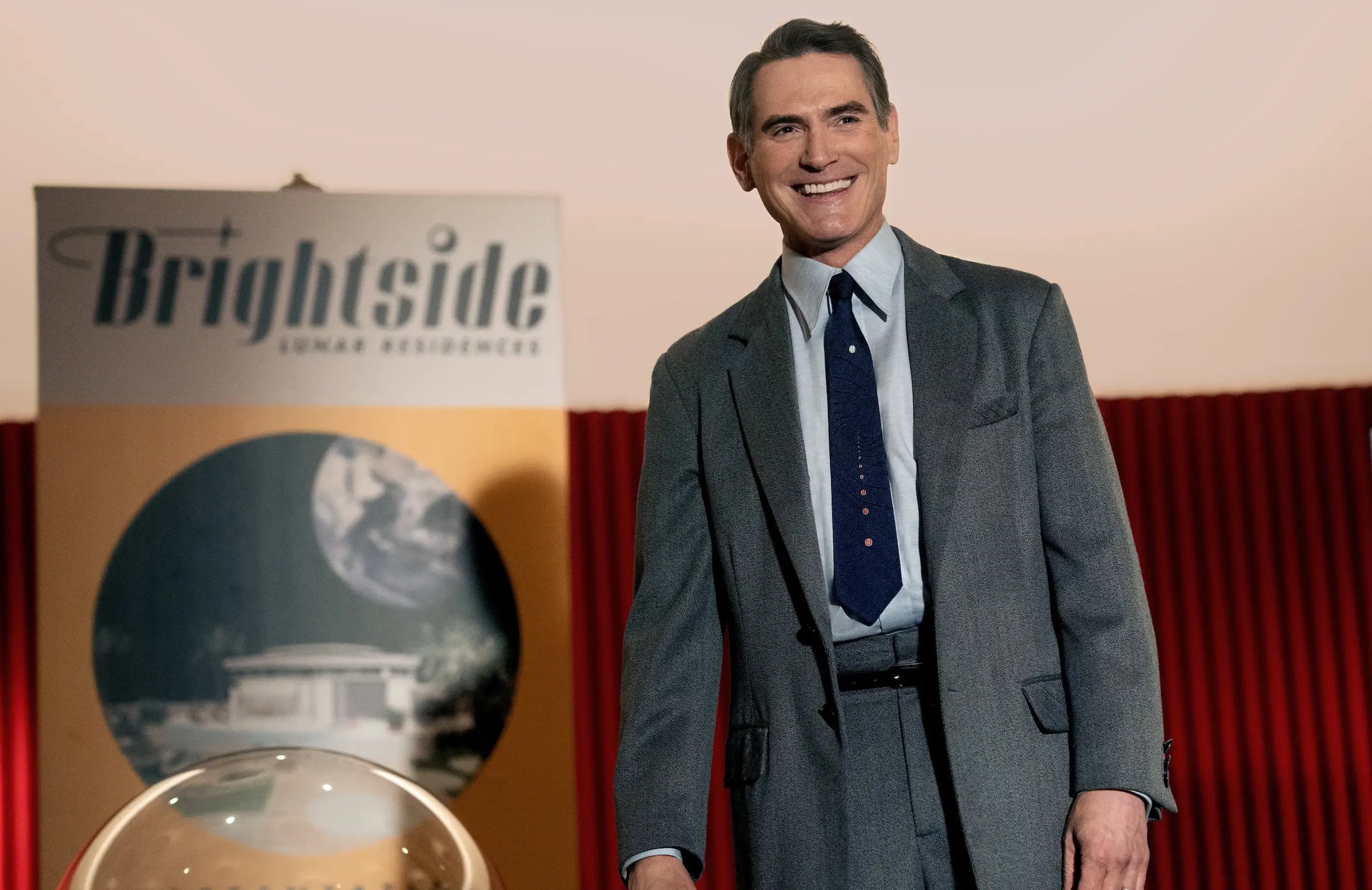Billy Crudup Flounders in a Disturbingly Hollow Sci-Fi Series
-
 Billy Crudup in Hello Tomorrow! (Photo: Apple TV+)
Billy Crudup in Hello Tomorrow! (Photo: Apple TV+)It’s not just the robots that seem inhuman on Hello Tomorrow! Apple TV+'s retro-futuristic series is set in a quaint American town, in an era that resembles the 1950s, but among the pillbox hats and black-and-white TVs, there are also hover cars, hologram telephones, and rockets carrying the rich to the moon. This is supposed to be the milieu for a saga about everyday people trying to find something genuine in their far-out world. Instead, it’s the backdrop for something disturbingly empty.
What’s most unsettling is that even though they’re played by flesh-and-blood actors, none of the characters behave like people. That’s got something to do with the heightened dialogue. When a character’s furious that his baseball team is losing, he doesn’t just call them idiots. He calls them “cross-eyed, half-wit, limp-noodle bums.” When another man worries he’s going to lose his job, his stilted lament is “I’ll probably need to inform Betty if I’m unemployed.” One character inexplicably mixes up his syllables, so that “possibility” becomes “pob-issility” and “obligation” becomes “ob-il-gation.”
If there were some kind of fire beneath this mannered speech, then it could be entertaining, like The Marvelous Mrs. Maisel in a Jetsons package. But the series never lets genuine feeling break through. At one point, a man loses his hand during a violent attack, and within three scenes, he and his girlfriend are breezily chatting about get-rich-quick schemes. His dismemberment doesn’t interrupt the rhythm of their snappy banter.
The show’s eerie inhumanity is perhaps even more evident in the first episode, when a woman gets crushed by a self-driving delivery van. There’s no blood to be seen, but as she lays on the ground, hairdo still looking perfect, her mint-green frock matches the paint on her garage door. Her near-death is mostly an aesthetic experience.
If a filmmaker like David Lynch were at the helm, then this stylized, superficial suffering might be the hellish point. However, series creators Amit Bhalla and Lucas Jansen are trying to be heartwarming. The plot follows Jack (Billy Crudup), a con artist who’s selling people fake timeshares on the moon. He’s all slick talk and fake compassion, yet he’s also trying to convince himself he’s a decent guy. That lie gets harder to maintain when he runs across Joey Shorter (Nicholas Podany), the son he abandoned decades ago. In a desperate stab at decency, Jack brings Joey into his business, without telling him the timeshares are bogus. Then he spends the rest of the season trying to build a real relationship out of that deception. There are many, many scenes of him almost telling his son the truth while sad music plays.
Meanwhile, Jack’s co-workers, who all think they’re working for a legitimate company, deal with love affairs, addictions, and dashed hopes. None of this is played ironically, and the season finale strains so hard for grandeur that it’s clear the audience is supposed to be moved. But the emotional moments are just as airless as the violent ones. Nothing gets ugly or raw. Nobody’s bed sheets are wrinkled. Everything slides right off the shiny surfaces.
Stranded, the actors rely on empty mannerisms. Crudup leans hard into an “old-timey salesman” persona, firing off his lines like he’s always trying to make a housewife buy a vacuum cleaner before she slams the door in his face. As one of Jack’s associates, Dewshane Williams moves and speaks like he’s in a fog, a choice so mannered that it’s distracting. Even the great Alison Pill, as a frustrated client trying to get to the moon, sticks to just a few shades of outrage. Only Hank Azaria, as a salesman with a gambling problem, projects ease with this material, but that makes him seem like he’s acting in a different, more naturalistic series than his castmates.
Meanwhile, the entire show is disconnected from the retro-futurist setting. Though there are plenty of clever design ideas about how the ‘50s might have looked with more advanced technology, those details are just gimmicks that have no bearing on the story. On a series like The Man in the High Castle, which imagines a world where America lost World War II, the revised history fundamentally impacts the narrative. In the movie Her, the protagonist’s conversations with a super-intelligent computer not only move the plot forward, but also create a potent metaphor about loneliness. In Hello Tomorrow!, the con man’s journey would feel just the same with or without a hover car. There’s no gadget nifty enough to inject blood into this story.
The first three episodes of Hello Tomorrow! premiere February 17 on Apple TV+. New episodes Fridays through March 31. Join the conversation about the show in our forums.
Mark Blankenship has been writing about arts and culture for twenty years, with bylines in The New York Times, Variety, Vulture, Fortune, and many others. You can hear him on the pop music podcast Mark and Sarah Talk About Songs.
TOPICS: Hello Tomorrow!, Apple TV+, Alison Pill, Amit Bhalla, Billy Crudup, Dewshane Williams, Hank Azaria, Lucas Jansen, Nicholas Podany